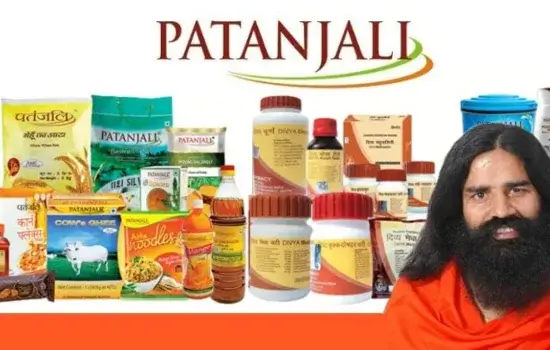Patanjali Ayurved Limited, co-founded by Baba Ramdev and Acharya Balkrishna in 2006, has emerged as one of India’s most significant players in the fast-moving consumer goods (FMCG) sector. With its roots deeply embedded in Ayurveda, Patanjali has revolutionized the market by offering products that align with traditional Indian values, focusing on health and wellness through natural and herbal ingredients. This article delves into a detailed SWOT analysis of Patanjali in 2024, assessing its strengths, weaknesses, opportunities, and threats in the current market landscape.
Current Overview of Patanjali

Patanjali’s journey from a small pharmacy in Haridwar to a giant in the FMCG sector is remarkable. The company offers a diverse range of products, including healthcare, personal care, food, cosmetics, and home care items, all of which are marketed under the banner of being natural and Ayurvedic. With an extensive distribution network across India and a growing online presence, Patanjali has made its products accessible to a broad consumer base. Despite facing stiff competition from established players like Hindustan Unilever, Dabur, and ITC, Patanjali has managed to carve out a significant market share, especially among consumers seeking natural and cost-effective alternatives.
SWOT Analysis of Patanjali in 2024
Strengths
1. Strong Brand Association with Indian Culture and Ayurveda: Patanjali’s brand is synonymous with Ayurveda and traditional Indian values. The association with Baba Ramdev, a popular yoga guru, has significantly enhanced the brand’s credibility and trust among consumers. This cultural connection allows Patanjali to appeal to a broad segment of the Indian population that prefers natural and Ayurvedic products.
2. Diverse Product Portfolio: Patanjali’s extensive range of products, spanning various categories like healthcare, personal care, food, and home care, enables it to cater to a wide audience. This diversity not only helps in cross-selling but also reduces the company’s dependence on any single product line.
3. Competitive Pricing: One of Patanjali’s major strengths is its pricing strategy. By offering products at 20-30% lower prices than its competitors, Patanjali has been able to capture a significant portion of the price-sensitive Indian market. This competitive pricing, coupled with the perception of high quality, makes Patanjali a formidable player in the FMCG sector.
4. Efficient Distribution Network: Patanjali has developed a robust distribution network that includes Patanjali Chikitsalayas, Arogya Kendras, Swadeshi Kendras, and various retail stores across India. This wide-reaching network ensures that its products are easily accessible to consumers, even in remote areas.
Weaknesses
1. Over-Reliance on Baba Ramdev: While Baba Ramdev’s association with Patanjali is a strength, it also poses a significant risk. The brand’s heavy reliance on his image means that any controversy or negative publicity involving him could adversely affect the company’s reputation and sales.
2. Quality Control Issues: Patanjali’s rapid expansion has sometimes led to challenges in maintaining consistent product quality across its diverse range. Quality control issues, particularly in its Ayurvedic medicines and supplements, have occasionally resulted in regulatory scrutiny and negative publicity.
3. Limited Global Presence: Despite its success in India, Patanjali has a relatively low presence in international markets. The company’s global footprint is limited, which restricts its ability to capitalize on the growing demand for natural and Ayurvedic products worldwide.
4. Perception as a Rural Brand: Patanjali’s strong association with rural India and traditional values may limit its appeal among urban and cosmopolitan consumers, who might prefer more modern and globally recognized brands.
Opportunities
1. Growing Demand for Natural and Herbal Products: The global shift towards health and wellness, particularly the increasing preference for natural and organic products, presents a significant opportunity for Patanjali. The company can leverage this trend to expand its product lines and capture a larger market share.
2. Expansion into International Markets: With the rising popularity of Ayurveda globally, Patanjali has a tremendous opportunity to expand its presence in international markets, especially in countries with a significant Indian diaspora. Strategic partnerships and alliances could facilitate this expansion.
3. E-commerce Growth: The surge in online shopping offers Patanjali an opportunity to strengthen its digital presence. By enhancing its e-commerce capabilities, the company can reach a broader audience and cater to the convenience-driven segment of consumers.
4. Innovation and Product Diversification: Patanjali’s focus on research and development can drive innovation, leading to the introduction of new products in categories like nutraceuticals, health supplements, and premium skincare. Diversifying into these areas can help the company stay ahead of competitors and meet evolving consumer needs.
Threats
1. Intense Competition: Patanjali operates in a highly competitive environment, facing challenges from both multinational corporations like Unilever and local players such as Dabur and ITC. The intense competition could lead to price wars, margin pressures, and market share erosion.
2. Regulatory Challenges: The complex regulatory landscape governing Ayurvedic products poses a threat to Patanjali. Non-compliance with regulations related to product safety, labeling, and advertising could result in legal penalties and damage to the brand’s reputation.
3. Supply Chain Disruptions: Patanjali’s reliance on a vast supply chain for sourcing raw materials and distributing products exposes it to risks associated with supply chain disruptions. Any disturbances could impact the company’s ability to meet consumer demand and maintain product quality.
4. Negative Publicity and Controversies: Past controversies, such as claims related to the efficacy of its products and issues with product quality, have negatively impacted Patanjali’s brand image. Ongoing scrutiny and potential future controversies could further damage consumer trust.
Conclusion
Patanjali Ayurved Ltd. has established itself as a major player in the Indian FMCG sector, thanks to its strong brand association with Ayurveda, competitive pricing, and diverse product portfolio. However, the company faces significant challenges, including over-reliance on its founder, regulatory hurdles, and intense competition. To sustain its growth and capitalize on emerging opportunities, Patanjali must focus on enhancing its global presence, improving quality control, and innovating in new product categories. With strategic planning and execution, Patanjali has the potential to not only maintain its dominance in the Indian market but also become a global leader in natural and Ayurvedic products.